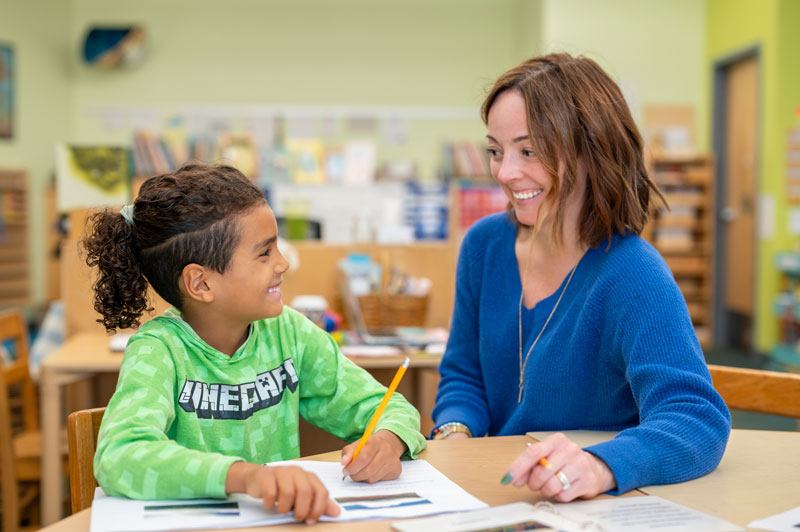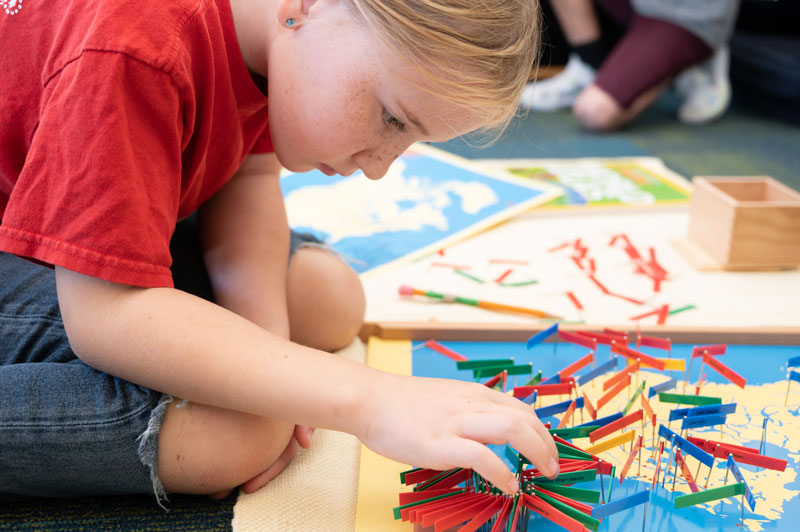The Magic of Montessori: Fostering Independence

“Never help a child with a task at which he feels he can succeed.” ~ Maria Montessori
A pioneer of progressive education, Maria Montessori believed in the power of the child’s innate talent and curiosity and stressed the importance of letting them follow their interests. She believed the goal of a school should be to cultivate this natural desire to learn, not to simply fill the child with facts. And by providing opportunities to explore independently, students will learn more and experience more joy at school.
Every aspect of a Montessori classroom—from the role of the teacher and the structure of the day to the furniture and learning materials—is intentionally designed for the child to develop a sense of agency for their learning.
In the classroom, Montessori students are empowered to make self-directed choices, solve their own problems, and value learning as its own reward. They develop self-reliance and confidence when they accomplish their goals.
The Role of a Montessori Teacher
When you walk into a Montessori classroom, you won’t find a teacher standing in front of a row of desks, presenting a lesson to a group of children. Children are free to choose their work and explore on their own, knowing the teacher will provide support and guidance when needed. Teachers will link each student with work and activities that match their interests, needs, and developmental level.
Students become actively engaged in their studies rather than passively waiting to be taught. They are encouraged to try new things and think for themselves. They build academic skills while developing confidence in their abilities.

The Montessori Environment
Everything in a Montessori classroom is designed with the child in mind. The environment is intended to calm students and entice them to explore. You’ll see natural wood, natural lighting, uncluttered shelves, comfortable furniture, and well-organized materials that follow a logical progression. The classroom is also arranged to maximize the child’s independence, concentration, and growing sense of responsibility.

What does learning look like?
In a Montessori classroom, the emphasis is on child-centered learning rather than a teacher-directed approach.
In a Montessori classroom, work is approached in a gentle and nurturing way that allows children to advance at their own pace. Self-correcting materials help students grasp concepts, and they learn not to be afraid of making mistakes. They come to see their mistakes as natural steps in the learning process. Children learn to problem-solve independently, building confidence in their achievements along the way.
Montessori learning is…
- Students exploring Montessori “works”—engaging materials designed to teach valuable academic skills while nurturing intrinsic motivation.
- Montessori works are self-correcting, designed so that the child can easily recognize, correct, and learn from an error without adult assistance.
- Students actively engage with each work until they have reached a place of mastery, which develops their ability to focus, hone fine and gross motor control, and problem-solve independently.

Independent Children, Confident Adults
The Montessori method stems from the belief that children are born intelligent. They’re worthy of our trust and respect—eager and capable of learning without constant adult supervision. The magic is in creating a learning environment that centers around the child and allows them to grow at their own pace. Learning becomes internalized and valued as they strive for their personal best.
“The education style and creative environment at Inly instilled a level of independence and confidence that was needed to become a successful entrepreneur and truly pursue my passions.”
Maxwell Zotz ’02 (Gould Academy, Brandeis University)
With independence, Montessori students naturally develop an internal sense of purpose and motivation. They experience greater self-confidence, discipline, and agency—values that will serve them well in high school, college, and into their adult lives.
Discover more about Montessori and Inly School’s Montessori+ curriculum here.




















